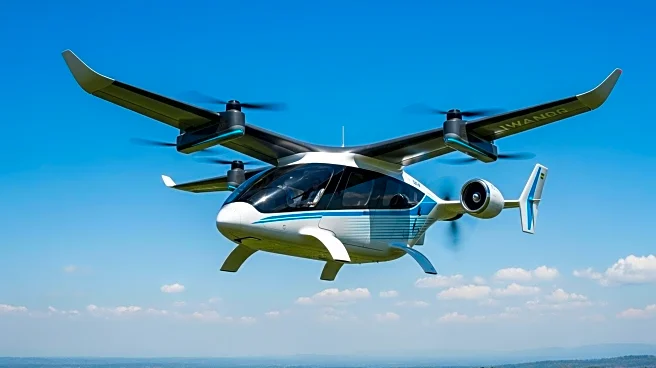What's Happening?
Rwanda has achieved a significant milestone in aviation by hosting Africa's first public flight of a self-flying electric air taxi. The event took place during the Africa Aviation Summit in Kigali and featured the EHang EH216-S, a pilotless electric vertical takeoff and landing (eVTOL) aircraft. This demonstration was a collaborative effort between the Rwandan government and the China Road and Bridge Corporation (CRBC), with technical support from EHang, a leader in urban air mobility. The initiative underscores Rwanda's commitment to adopting innovative transport solutions that can transform urban mobility, reduce congestion, and provide sustainable options. Minister of Infrastructure Jimmy Gasore emphasized Rwanda's readiness to foster a progressive regulatory framework for emerging aviation technologies.
Why It's Important?
This development positions Rwanda as a leader in advanced air mobility on the African continent. By embracing cutting-edge technologies like eVTOL, Rwanda aims to enhance urban connectivity and stimulate economic dynamism. The successful demonstration of the self-flying air taxi could attract further investment, partnerships, and technical expertise, potentially making Rwanda a hub for advanced aviation technologies in Africa. The initiative also builds on Rwanda's previous success with drone delivery services in the healthcare sector, showcasing the country's ability to integrate digital aviation solutions effectively. This move could inspire other African nations to explore similar technologies, potentially revolutionizing transport across the continent.
What's Next?
Following the successful demonstration, Rwanda is likely to continue developing its regulatory framework to support the integration of autonomous aerial transport into its airspace. This could involve further collaborations with international partners and stakeholders to ensure the safe and efficient deployment of eVTOL technologies. The demonstration serves as a real-time case study for policymakers and industry players, which may lead to more widespread adoption of self-flying aircraft in Africa. As Rwanda continues to pioneer in this field, it may also influence regional aviation policies and encourage other countries to explore similar innovations.
Beyond the Headlines
The introduction of self-flying electric air taxis in Rwanda highlights broader implications for urban planning and environmental sustainability. By reducing reliance on traditional ground transport, these technologies could significantly decrease urban congestion and lower carbon emissions. Additionally, the successful integration of such advanced technologies could enhance Rwanda's global reputation as a forward-thinking nation, potentially boosting tourism and international business interest. The ethical and safety considerations of autonomous flight will also be crucial as Rwanda navigates the complexities of this new aviation frontier.












